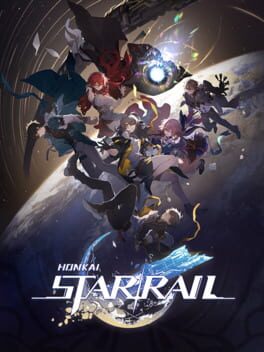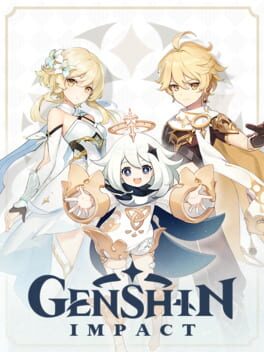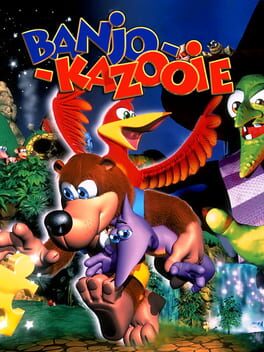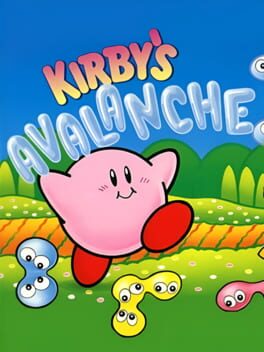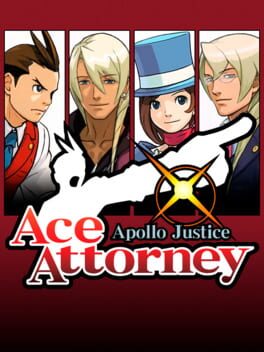chivela
6 reviews liked by chivela
Honkai: Star Rail
2023
Genshin Impact
2020
Banjo-Kazooie
1998
Kirby's Avalanche
1995
Me, an ice-9 connoisseur, when I get locked in a freezer unexpectedly: https://imgur.com/a/Ks7HrbY
So, here we are. Having written my Dual Destinies review (one of my favorites I've written, still) and almost being finished with Spirit of Justice, I feel its about time I toss my hat into the ring regarding AA4, possibly the most discussed Ace Attorney game of them all. There's a lot to unpack with AA4, and a lot of different ways to unpack it.
After AA1/2/3 wrapped up as a pretty much perfect, concluded trilogy, the 4th game had to be one to really break some sort of new ground, to not just seem as if the franchise was being stretched thin. And to outsiders looking in, be assured: They did far more than just give us a new protagonist. You meet Phoenix only to find out that he's completely changed, the perception of what makes a good defense lawyer has changed, your relation to the prosecution has changed, the story being told and, indeed, the very world of the game has shifted wholly. Its a remarkably ambitious game: One that, rather than just telling another story of a new character's growth like the old trilogy did, chose to readjust the lens of the series to focus far more on the law world at large, whilst subverting player expectations along the way.
I'll drop the dramatics and be blunt: In terms of ambition, ideas and themes, AA4 ranks as possibly my favorite game in the series. But as the finished game we got, I consider it the least enjoyable game in the series I've played.
Yet I can't even be sure if that's a bad thing. Because with so many of the issues I take with the game, there's a fascinating viewpoint that changes it into an interesting positive that also fits right in with the game's general direction of...well, misdirection, and subversion. Simply put, its an artsy game. For example, I noted halfway through my playthrough that the game's repertoire of characters are all mostly annoying, mean, or hard to work with, which leads to me as a player feeling miffed. Yet at the same time, Apollo is living in a new age of distrust and darkness in the legal world. He's living in an age where few feel like they can trust in others anymore, because people like Kristoph who desire results far above truth or fairness rule the justice system: The idea of "evidence" is so easily manipulated, that anyone can escape justice. Thus, Apollo's unable to have his perfect storybook journey of growth and support like Phoenix had because the world around him has changed to be hostile. So, is it really right of me to complain about the game doing what it sets out to do exceptionally well?
On the topic of Apollo himself, its very interesting that he himself is such a passive and static figure throughout most of the game, which underwhelmed me at first. But like I said: This isn't a character-driven story like the Trilogy, so is Apollo's lack of focus a BAD thing? Is the game trying to subvert what came before, rather than running with the tried-and-true optimistic hero's journey, a bad thing? Its a lot of these dilemmas I run into when thinking about the game, and its the reason why I respect it so highly despite the actual process of playing it being a lot more middling than the rest of the series in my eyes.
With all that being said, for as much intent as the game may otherwise have, it IS still Ace Attorney and comes with all the pros and cons of that. The animation is gorgeous, music is stellar, most of the overall mysteries are still pretty fun to unravel, and the whole gameplay of untangling testimonies is as fun as ever. The great fundamentals are still here and keep it enjoyable to play to a degree, and you can even sort of tell a new director is at the helm with this project.
Mitsuru Endo, previously a game designer first and foremost on games like Breath of Fire and Sengoku Basara, really rubs off his love for new gameplay systems and quirks in this game. Like usual for the series though, these systems end up being a mixed bag. Investigating evidence can be pretty fun and is a natural fit for the series, and Percieving is a cool and distinct power, iconic to Apollo. Yet then you have stuff like Ema's Forensics minigames, which feel really out of place and are uninteresting to engage with. There's no puzzle to them, just a good ol' DS touchscreen game. You get the feeling a lot of these things, and the systems exclusive to the third and fourth case, were added as a novelty, as fun toys for the player to engage with rather than being anything substantial...yet at the same time, as a game themed around magic tricks, isn't that heightened interactivity also part of the point?
In terms of writing and general direction, the main thing I think Takumi's games (those being the Ace Attorney Trilogy and The Great Ace Attorney Chronicles) are worse at than his peers' is linking cases together to form a cohesive whole. Takumi excels in writing amazing and deviously clever singular cases, but in all his games its as if he can't resist including one or two bonus cases solely for how cool their mysteries are, rather than thinking of how their inclusion will affect the pacing of the game in its totality. Samurai, Big Top, Masked, Recipe, a lot of the individual mysteries in Ghost Trick, Speckled Band, Clouded Kokoro, the first two cases entirely in The Great Ace Attorney 2...don't get me wrong, I think his works are almost universally fantastic, but at times they can feel disjointed to progress through due to his unashamed love of "filler".
Under Endo's directing, meanwhile, it does feel like effort was placed on giving all cases purpose, reigning in Takumi's style of writing just enough to get the best of both worlds. All cases have substantial meaning, yet are able to be as zany and clever as Takumi always loves to write them. Beyond being a crazy case of solving several crimes at once, 4-2 serves to highlight how much Phoenix has changed and how Trucy helps him. 4-3 features a murder that takes place during a series of live stage performances, asking you to rewatch its footage to catch specific details related to witness testimony. At the same time, it also has a great focus on Klavier as a character, and the corrupt police-force that's been able to thrive in this new age, asking questions on if the law is always just in what it stands for. Yet that being said, we run back to the original issue of fun: Despite its cool themes and depth, 4-3 remains the worst case in any Ace Attorney game to actually play, both because of poor gameplay pacing, but also because the writing doesn't feel fleshed out enough to properly convey its brilliant ideas.
The lack of Psyche-Lockes as well honestly destroys the fun of investigating, and the pacing across all three cases featuring investigations is honestly dreadful. The only substitute present for the lack of Psyche-Lockes is the aforementioned mind-numbing forensics minigames, which do little to help things. Now, I noted in my Dual Destinies review that that game also had underwhelming gameplay, but it to me was salvaged by still having a rock solid, well-paced story pace where things were always happening. The game lacks Psyche-Lockes (for most of it) as well but makes up for it with a steadier stream of discoveries, more interesting 3D crime scene investigations, and so on. Due to AA4s insistence on finding meaning in the mundane, it ends up far less fun to play.
So, its a really tough call. I don't think AA5 or 6 are as ambitious or nuanced in what they want to convey as AA4, yet but they make up for it by having more engaging story events and better pacing across the board, leading to a more enjoyable experience for me. They're stories that are told in a tighter and more fun way than AA4, yet it feels wrong to label the game as "the worst Ace Attorney!!" because, again, it tries so hard and has such a unique flair as by far the most artistic game in the series.
Had this been the final Ace Attorney as originally intended, it would've been an impactful note to end on. But I am glad we did get more games in the series, and it led to great things. The murky law world of AA4 begins to heal across the events of AA5, and AA6 gives you an insight into just how badly it could have escalated, emphasizing a theme of preparing the new generation to solve the issues that are inevitably going to occur through the old generation's stubbornness and evil. Apollo finally becomes a character with agency and goals, Trucy's relationship to the Gramarye's is given a sweet bookend, we get to see how Edgeworth and Klavier handle the growingly unjust law world, Ema is, there, and Phoenix takes on the mentor role he was destined to do.
What I'm saying is: I'm really happy with how AA4, 5 and 6 turned out as a trilogy, even though it makes AA4's ambition stick out in hindsight, and now just exists as "that one weird game" rather than "the crazy rug-pull finale of the series". Despite my grievances with it, I do still love AA4, and I'm glad its resonated with so many people. But its overambition alongside its stumbles, from pretty shallow gameplay additions to bad pacing, keep me from loving it wholesale and having it click entirely. Simply put, a lot of its "but its like this way on purpose"-isms just don't land with me the way they do in games like Suda51's work. Yet it remains Ace Attorney at its core, and the simple fact that they even tried in a series otherwise aiming for as much mass appeal as this one, is worth so much respect.
Apollo Justice: Ace Attorney is forever going to be a standout game in the series, and for me that's both for better and for worse. Basically, I'm just glad it exists, even if its not for me.
[Play Time: 35 Hours]
[Key Word: Overzealous]
After AA1/2/3 wrapped up as a pretty much perfect, concluded trilogy, the 4th game had to be one to really break some sort of new ground, to not just seem as if the franchise was being stretched thin. And to outsiders looking in, be assured: They did far more than just give us a new protagonist. You meet Phoenix only to find out that he's completely changed, the perception of what makes a good defense lawyer has changed, your relation to the prosecution has changed, the story being told and, indeed, the very world of the game has shifted wholly. Its a remarkably ambitious game: One that, rather than just telling another story of a new character's growth like the old trilogy did, chose to readjust the lens of the series to focus far more on the law world at large, whilst subverting player expectations along the way.
I'll drop the dramatics and be blunt: In terms of ambition, ideas and themes, AA4 ranks as possibly my favorite game in the series. But as the finished game we got, I consider it the least enjoyable game in the series I've played.
Yet I can't even be sure if that's a bad thing. Because with so many of the issues I take with the game, there's a fascinating viewpoint that changes it into an interesting positive that also fits right in with the game's general direction of...well, misdirection, and subversion. Simply put, its an artsy game. For example, I noted halfway through my playthrough that the game's repertoire of characters are all mostly annoying, mean, or hard to work with, which leads to me as a player feeling miffed. Yet at the same time, Apollo is living in a new age of distrust and darkness in the legal world. He's living in an age where few feel like they can trust in others anymore, because people like Kristoph who desire results far above truth or fairness rule the justice system: The idea of "evidence" is so easily manipulated, that anyone can escape justice. Thus, Apollo's unable to have his perfect storybook journey of growth and support like Phoenix had because the world around him has changed to be hostile. So, is it really right of me to complain about the game doing what it sets out to do exceptionally well?
On the topic of Apollo himself, its very interesting that he himself is such a passive and static figure throughout most of the game, which underwhelmed me at first. But like I said: This isn't a character-driven story like the Trilogy, so is Apollo's lack of focus a BAD thing? Is the game trying to subvert what came before, rather than running with the tried-and-true optimistic hero's journey, a bad thing? Its a lot of these dilemmas I run into when thinking about the game, and its the reason why I respect it so highly despite the actual process of playing it being a lot more middling than the rest of the series in my eyes.
With all that being said, for as much intent as the game may otherwise have, it IS still Ace Attorney and comes with all the pros and cons of that. The animation is gorgeous, music is stellar, most of the overall mysteries are still pretty fun to unravel, and the whole gameplay of untangling testimonies is as fun as ever. The great fundamentals are still here and keep it enjoyable to play to a degree, and you can even sort of tell a new director is at the helm with this project.
Mitsuru Endo, previously a game designer first and foremost on games like Breath of Fire and Sengoku Basara, really rubs off his love for new gameplay systems and quirks in this game. Like usual for the series though, these systems end up being a mixed bag. Investigating evidence can be pretty fun and is a natural fit for the series, and Percieving is a cool and distinct power, iconic to Apollo. Yet then you have stuff like Ema's Forensics minigames, which feel really out of place and are uninteresting to engage with. There's no puzzle to them, just a good ol' DS touchscreen game. You get the feeling a lot of these things, and the systems exclusive to the third and fourth case, were added as a novelty, as fun toys for the player to engage with rather than being anything substantial...yet at the same time, as a game themed around magic tricks, isn't that heightened interactivity also part of the point?
In terms of writing and general direction, the main thing I think Takumi's games (those being the Ace Attorney Trilogy and The Great Ace Attorney Chronicles) are worse at than his peers' is linking cases together to form a cohesive whole. Takumi excels in writing amazing and deviously clever singular cases, but in all his games its as if he can't resist including one or two bonus cases solely for how cool their mysteries are, rather than thinking of how their inclusion will affect the pacing of the game in its totality. Samurai, Big Top, Masked, Recipe, a lot of the individual mysteries in Ghost Trick, Speckled Band, Clouded Kokoro, the first two cases entirely in The Great Ace Attorney 2...don't get me wrong, I think his works are almost universally fantastic, but at times they can feel disjointed to progress through due to his unashamed love of "filler".
Under Endo's directing, meanwhile, it does feel like effort was placed on giving all cases purpose, reigning in Takumi's style of writing just enough to get the best of both worlds. All cases have substantial meaning, yet are able to be as zany and clever as Takumi always loves to write them. Beyond being a crazy case of solving several crimes at once, 4-2 serves to highlight how much Phoenix has changed and how Trucy helps him. 4-3 features a murder that takes place during a series of live stage performances, asking you to rewatch its footage to catch specific details related to witness testimony. At the same time, it also has a great focus on Klavier as a character, and the corrupt police-force that's been able to thrive in this new age, asking questions on if the law is always just in what it stands for. Yet that being said, we run back to the original issue of fun: Despite its cool themes and depth, 4-3 remains the worst case in any Ace Attorney game to actually play, both because of poor gameplay pacing, but also because the writing doesn't feel fleshed out enough to properly convey its brilliant ideas.
The lack of Psyche-Lockes as well honestly destroys the fun of investigating, and the pacing across all three cases featuring investigations is honestly dreadful. The only substitute present for the lack of Psyche-Lockes is the aforementioned mind-numbing forensics minigames, which do little to help things. Now, I noted in my Dual Destinies review that that game also had underwhelming gameplay, but it to me was salvaged by still having a rock solid, well-paced story pace where things were always happening. The game lacks Psyche-Lockes (for most of it) as well but makes up for it with a steadier stream of discoveries, more interesting 3D crime scene investigations, and so on. Due to AA4s insistence on finding meaning in the mundane, it ends up far less fun to play.
So, its a really tough call. I don't think AA5 or 6 are as ambitious or nuanced in what they want to convey as AA4, yet but they make up for it by having more engaging story events and better pacing across the board, leading to a more enjoyable experience for me. They're stories that are told in a tighter and more fun way than AA4, yet it feels wrong to label the game as "the worst Ace Attorney!!" because, again, it tries so hard and has such a unique flair as by far the most artistic game in the series.
Had this been the final Ace Attorney as originally intended, it would've been an impactful note to end on. But I am glad we did get more games in the series, and it led to great things. The murky law world of AA4 begins to heal across the events of AA5, and AA6 gives you an insight into just how badly it could have escalated, emphasizing a theme of preparing the new generation to solve the issues that are inevitably going to occur through the old generation's stubbornness and evil. Apollo finally becomes a character with agency and goals, Trucy's relationship to the Gramarye's is given a sweet bookend, we get to see how Edgeworth and Klavier handle the growingly unjust law world, Ema is, there, and Phoenix takes on the mentor role he was destined to do.
What I'm saying is: I'm really happy with how AA4, 5 and 6 turned out as a trilogy, even though it makes AA4's ambition stick out in hindsight, and now just exists as "that one weird game" rather than "the crazy rug-pull finale of the series". Despite my grievances with it, I do still love AA4, and I'm glad its resonated with so many people. But its overambition alongside its stumbles, from pretty shallow gameplay additions to bad pacing, keep me from loving it wholesale and having it click entirely. Simply put, a lot of its "but its like this way on purpose"-isms just don't land with me the way they do in games like Suda51's work. Yet it remains Ace Attorney at its core, and the simple fact that they even tried in a series otherwise aiming for as much mass appeal as this one, is worth so much respect.
Apollo Justice: Ace Attorney is forever going to be a standout game in the series, and for me that's both for better and for worse. Basically, I'm just glad it exists, even if its not for me.
[Play Time: 35 Hours]
[Key Word: Overzealous]
